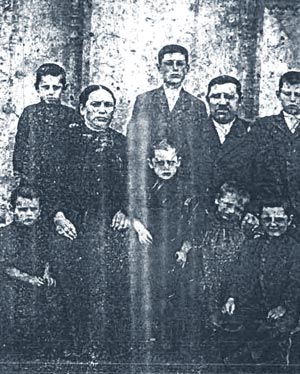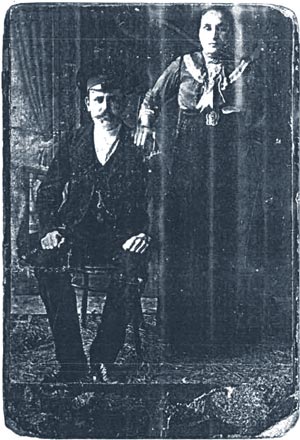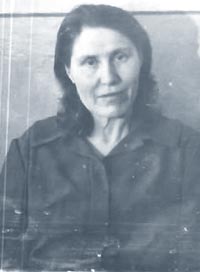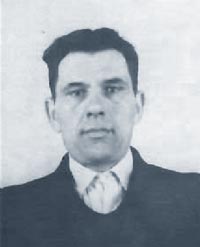









Author: Margarita Vadimovna Balyberdina
Secondary school N° 11, city of Krasnoyarsk, 9th term
Project leader: Yelena Valentinovna Balyberdina
• general projekt management
• support in research
• excursion into history
• support with the selection of literature
• correction
City of Krasnoyarsk
2006
The paper on hand tells about the cruel fate of the Seel family, ethnic Germans who passed through all important tropics in Russia’s history in the 20th century: revolution, collectivization, war, deportation from Germany to Siberia. Frieda and Reinhold Seel are the great-grandparents of the authoress. Due to a series of events and circumstances, the authoress lives in Krasnoyarsk, the first place the members of the Seel family were taken to for special resettlement. Their trip began in the village of Krasniy Yar, in the Ukraine; at first they were to head for Germany, later they ended up in Siberia – in Krasnoyarsk and Irkutsk. The trip lasted a whole lifetime.
Frieda Ivanovna Seel, my great-grandmother, died on the 9 November 2006. Unfortunately, I did not have the opportunity to see her very often or be in regular contact with her, for she lived in Irkutsk, which is quite for away from Krasnoyarsk. For this reason, my paper is mainly based on stories and events my grandmother Lilia Seel and her daughter told me about. Lilia was an eye-witness and participant in the events of the 1940s and 1950s. She made this unique “trip” with her parents, shared the hard lot with all the other ethnic Germans who lived in the USSR. The compulsory trip almost coincided with the birth of my grandmother. Lilia Seel was born in the Ukraine, Nikolaevsk Region, in the little town of Krasniy Yar, on the 29 June 1943. Here I have to make an indispensable degression into history, in order to explain how the German family of the Seels happened to get into this Ukrainian village, which has a name that sounds so similar to Krasnoyarsk.
Most of the villages in the vicinity of Nikolaevo, Zhitomir and Odessa were founded by German colonists in the 18th century. The mass resettlement of Germans to the new Russian territories was favoured by a whole series of factors. One of them were religious controversies. The Catholic Council pursued a strict policy with regard to Luther’s followers; they were accounted heretics, their families were persecuted. Hence, many people were forced to leave their native places. Others decided to remove to Russia forsome mercantile interest.
Catherine II promised them land and, in fact, allocated farmland to the impoverished, landless German farmers upon their arrival in Russia. The farming communities were not subject to taxation. Their sons were not called up into the army. We do not know the exact reasons, why our relatives came to Russia, but we are aware of the fact that the Seels, Schlechts and Gellerts had come here from Baden-Wuerttemberg in order to found a settlement. The Jews, also immigrants from German territories, later founded cantons in the adjacent areas. Many children were born to the German families – the manpower of the future was brought up.

Photo N° 1 . The Schlecht family . Late 19th century.
Over the years the families became quite wealthy. The sowed cereals, raised
cattle and dealt with viniculture. They preserved the German tradition,
exclusively spoke German among eachother and were able to understand Hebrew.
Their respectible, steady life went on till the beginning of the 20th century.
Their neighbourship with the Jews saved the family during the dekulakization
process in the 1930s. They of all people granted the Schlechts and the Seels
shelter, when their heads of the family were arrested and their houses were
confiscated. After the outbreak of the war the Germans, in return, helped to
hide Jewish children.
Let us now get back to the year 1943. At this time the Ukrainian territory had
already been occupied by the Fascists’ troops. However, they practically did not
sojourn in any of the German settlements, for they were convinced that they
could rely on the loyalty of the German population; the main thing was that they
could unhamperedly continue their advance towards Moscow and other Russian
cities. But as everybody is aware, history has shown that the blitzkrieg failed,
the enemy was stopped near Moscow; the battles of Stalingrad, Kursk and others
took place. The German troops had to withdraw and began to move back to the West.
Hitler ordered all citizens of German nationality living on USSR territory to
leave their villages and towns in order to “return” to their home country.
Germany was in urgent need of working hands. He had not yet lost his hope for
world domination.
Frieda and Reinhold Seel hitch up the cart and set out for Germany with their one-year old child and Freidas’s mother – Olga Schlecht.
It was the first large-scale departure of Germans from Russia in the 20th century. The people went by cart, many went on foot driving their cattle with them. The trip dragged on for months. It was pouring with rain, the roads were all muddy and hardly passable. It would happen that horses collapsed by exhaustion. In one of those nights, during a horrible thunderstorm, one of the horses shied, swerved and overturned the cart with all the freight on it. While Frieda and Reinhold stayed at the scene of the accident, grandmother Olga took her little granddaughter on her arms and contined the trip: the were taken along by other refugees who had offered them to sit on their cart. At daybreak, when the thunder-storm was over, they were all sure to meet again a few kilometers ahead. Would it be difficult to overtake the others?
The following morning, they did not find eachother again: the scene was so crowded with people, there were so many partings of the ways that they had no chance … Frieda and Reinhold had lost their mother and child. At that time, however, all ways were leading to Germany, for they had no choice to go somewhere else. In Germany they were assigned to work on a farm. They had to work for a Bauer (this is what they call a strong man with an estate in Germany). Frieda had to milk the cows, Reinhold took the milk to the dairy. At the same tome grandmother Olga was working for another German family from morning to night.
She and Lilia happened to get to a farm, too, in a place not far from Berlin. The child was looked after by a nanny. The childless family even asked for the permission to adopt the child. But grandmother was not willing to give her consent; she did not abandon hope to one day finding her relatives again. And she continued to hope against hope when she returned to the USSR at the first opportunity.
Soon after the war Stalin demanded the return of all Russians, of all thos Russieans, Belorussians, Ukrainians, prisoners of war, prisoners of the concentration camps and ethnic Germans, who had been deported to Germany – by force, against their own will. They were to return to their former villages and towns, to their regions. However, the trains, the waggons of which were not at all suitable for the transportation of human beings, went from Germany directly to Siberia. The people had been betrayed. Oma Olga and Lilia arrived in Krasnoyarsk a couple of weeks later, after an apparently neverending “trip”. At the station they were asked to change to a cart. They were taken to a kolkhoz farm. 24 families were accomodated in a decayed granary, in the middle of which stood a small round iron stove. They arranged their pallets around the stove, for they were condemned to spend the winter in this unfortunate place. In order to receive at least her daily piece of bread to survive, grandmother Olga worked for thesorting department of the vegetable stock; she hid a few potatoes inside the pleats of three-year old Lidia’s clothes, which probably saved both their lives during these fatal years. They were not paid any salary for the work they had done; they received food fation cards instead. During the summer they eked out a living by gathering wild garlic, berries and mushrooms.
In December 1946 they were all called up into the labour army and carried off
once again.
They were to work for the timber industry. They were taken to some forest
district, where old people and women received shovels and crowbars to build
dug-outs for all of them. They lived in these huts till the spring. Those fit
for work went to fell trees, the children stayed in the dug-outs. They received
food ration cards for the supply of 300 grs of bread, pearl barley and some stew;
those who did not earn their own keep received considerably less food.
All special resettlers had to regularly show up with the commandant’s office for registration. It was impossible to leave the place of residence, not even fpr a short time, not to mention a removal. However, a vivid exchange of letters began to develop between the different villages. In the envelopes of entirely unknown senders people found little memos informin the reader who …from the village of … was searching for whom. It became evident that many people were in desperate search for their relatives. By means of such a little memo, Frieda and Reinhold found their lost family members. It turned out that they had also been deported from Germany to Siberia, but they had been taken to the Irkutsk Region, where they had been assigned to work for the timber industry. Frieda was not permitted to leave immediately. At first she had to evidence that Lilia was, in fact, her daughter. Half a year passed by until the authorities finally gave their ok. Grandma Lilia still recalls, how her mum and grandma Olya were crying, embracing her again and again. It was a miracle, after all, that their family had been united: first they had got separated in the Ukraine, than they happened to get to Germany, had to overcome the war, cold, hunger and deportation and then, three years later, reunited in Siberia. The family was resettled in the settlement of Koty on Lake Baikal; the adults worked for the gold mine, hauling the rocks out of the pit by wheelbarrows. In 1949 some families removed to the little town of Taltsy. Frieda was assigned to work for the glass factory, Reinhold for the timber industry. Here we have to mention that Lidia’s father had been an invalid since his boyhood. At the age of fifteen he had lost one hand while he was working on the kolkhoz farm. Nevertheless he kept working hard all his life; he was not afraid of doing even hard labour. In the 1950s they began to build 32-room barracks; each of these tiny rooms was to accommodate one family. There was a mix of different nationalities: Ukrainians, Lithuanians, Moldavians, Germans. But there was one thing they had all in common and which rose grief and despair: the lack of rights. They were particularly afraid to say unnecessary words; they feared to be thrown a wry look at. They were exclusively using the Russian language to communicate. Oma Lilia now recalls that half of her life she had been afraid to admit that she was German. In order to protect her children, she made desperate efforts to “forget” about German traditions and her German name.
After Stalin’s death they began to hope for their soon release. In 1956 Frieda and Reinhold received passports. They were now officially permitted to go back to their homeland, the Ukraine, or chance the place of residence within the USSR. They were unable to return home to their former property. They had four children, and a removal necessitated quite a lot of money. And, in actual fact, there was no definite place they could set out for. There house in the Ukraine had been transferred to the village Soviet. Frieda’s and Reinhold’s fathers had already been dispropriated in the 1930s and were later arrested and executed. The family learned about this only in 1956. Having submitted a request, grandma Olga finally received the rehabilitation certificate.

Photo N° 2 . Ivan and Olga Schlecht . Frieda’s parents.
Nowadays, State and society acknowledge the forcible resettlement of peoples a crime. In the 21st century, as a consequence of all these democratic processes which are interfusing the whole world, we must not tolerate any conditions and situations, which might lead to another genocide. We always have to bring to our minds the history of our state, but we must not forget the history of our own family, either. The history of a family reflects the history of the state – in miniature.
My exposition concentrated on my German stirps only. However, my Russian grandfathers from my mother’s side were also affected by repressions here in Siberia in the 1930s. One of them was a clergyman, the other an officer.
Finally, we can say that a series of conditions and circumstances emerged in the USSR in the 1930s and 1940s, under which it was completely irrelevant who you were – Russian, German, clergyman, atheist, university graduate or illiterate. Anybody could be deprived of his rights, be arrested and deported.
We must never forget the lessons history taught us about the recent past.
Olga Schlecht, Frieda and Reinhold Seel rest in peace in the Irkutsk Region, which became their new homeland, as described in the scenario written by the Tragedic History of Russia.

Frieda Seel

Reinhold Seel
1. Interview given by L.R. Balyberdina (born Seel)
2. Encyclopaedia for children, Volume: The History of Russia
3. World History, Vol. 1, Moscow, “Avanta” Publishers, 1994, p. 385-386
4. Information edition N° 6 “Methodical Seminar” for researchers – “Political
repressions
in the USSR”, Krasnoyarsk, 2006
4a) J.L. Zberovskaia. Life under the conditions of deportation
4b) Zh. A. Serzhanova. The history of the resettlement of the Volga-Germans to
Siberia
during the Great Patriotic War
5. Material from the website www.memorial.krsk.ru
6. Photos from the family archive of the Seels
7. Rehabilitation certificate of L.P. Seel
8. Rehabilitation certificate of L.P. Seel and R.F. Seel dated the 01.06.2001